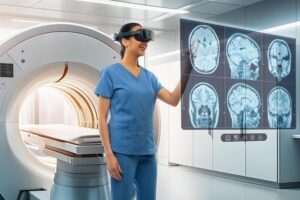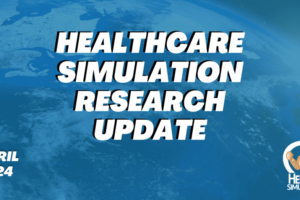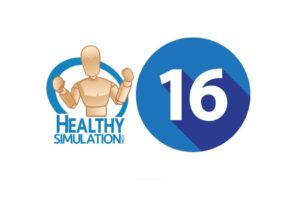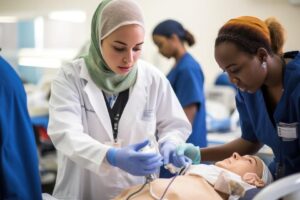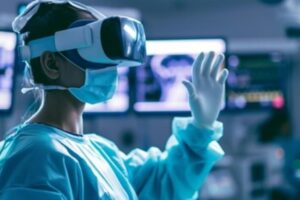Healthcare Simulation Research Journals
Medical Simulation is an emerging professional field within healthcare education, training, and patient safety. Healthcare Simulation Research Journals have paved the way for academic exploration, understanding, and evolution of the modern day methodology with numerous unique moving parts including: scenario development, debriefing, facilitation, technology, operations, learning theories, and more. Here we list all of the available medical simulation journals and healthcare simulation research publications available from around the world. Those looking for longer reads should check out our Healthcare Simulation Books page! Have something to add? Email us and share your resource!
Below you can read more about each one of the research journals which focus entirely on clinical simulation:
- BMJ’s Simulation & Technology Enhanced Learning
- Advances in Simulation
- Clinical Simulation in Nursing
- Simulation in Healthcare
- The Journal of Surgical Simulation
- Simulation & Gaming
- IPSS Cureus Channel
- International Journal of Healthcare Simulation
- The Journal of Medical Extended Reality
Following that is a list of other healthcare education and patient safety journals which frequently publish simulation in healthcare content.
Sponsored Content:
British Medical Journal of Simulation & Technology Enhanced Learning, Affiliated with the Association For Simulated Practice in Healthcare
The BMJ Simulation & Technology Enhanced Learning (STEL) Journal focuses on the use of simulation and innovative technology as an educational method or intervention for professionals in all areas of health and social care education, workforce development and quality of care. The journal seeks to contribute to research, innovation and knowledge translation for practitioners, teachers, students and leaders in all health and social care professions who wish to improve clinical outcomes, patient experience, and safety utilizing simulation in healthcare. This includes scholarly activity undertaken in conjunction with colleagues from diverse disciplines spanning psychology, sociology, anthropology, safety science, engineering, information technology, art and design, linguistics and more.
HealthySimulation.com is dedicated to providing the latest healthcare simulation research and journal information from around the world. To follow along, sign up for our free medical simulation email newsletter, follow @HealthySim on Twitter and @HealthySim on Facebook, or join our HealthySim LinkedIn Group!
The journal included the latest research, reviews, editorials, case studies and policy papers in the use of simulation in education, training and professional development as well the increasingly diverse fields of innovative learning technologies: online and distance learning, MOOCs, Web 2.0 and Wikis, mobile learning technologies, manikins, serious gaming, podcasts, animation and other multimedia in both virtual and physical teaching environments. BMJ STEL is the official journal of ASPiH and the Editor-in-Chief is Professor Nick Sevdalis of King’s College London, in the United Kingdom.
Sponsored Content:
Advances in Simulation, Official Journal of the Society in Europe for Simulation Applied to Medicine (SESAM)
Advances in Simulation is the official open access journal of the Society in Europe for Simulation Applied to Medicine (SESAM). Advances in Simulation provides a forum to share scholarly practice to advance the use of simulation in the context of health and social care. Editor-in-Chief of this journal is Professor Dr. Debra Nestel, of Monash University, Australia. Advances in Simulation publishes articles that cover all science and social science disciplines, all health and social care professions and multi- and inter-professional studies.
The journal includes articles relevant to simulation that include the study of health care practice, human factors, psychology, sociology, anthropology, communication, teamwork, human performance, education, learning technology, economics, biomedical engineering, anatomy, physiology, pharmacology, therapeutics, scientific computation, simulation modeling, population studies, theatre, craft, program evaluation and more. All articles published by Advances in Simulation are made freely and permanently accessible online immediately upon publication, without subscription charges or registration barriers
SESAM was founded in 1994 in Copenhagen and aims to encourage and support the use of clinical simulation in health care and medicine for the purpose of training and research. Key roles of SESAM are to develop and support the application of simulation in education, research, and quality management by facilitating collaborations and the exchange of technology and knowledge throughout Europe.
Clinical Simulation in Nursing, Official Journal of the International Nursing Association for Clinical Simulation and Learning (INACSL)
Clinical Simulation in Nursing is an international, peer reviewed journal published online monthly that is the official journal of the International Nursing Association for Clinical Simulation & Learning (INACSL) organization, which focuses on nursing simulation. Clinical Simulation in Nursing has a 2015 Impact Factor of 1.360, ranking favorably in the Nursing category. INACSL’s mission is to advance the science of healthcare simulation. INACSL has operationalized its mission by developing the first standards for simulation practice, INACSL Standards of Best Practice: Simulation, Published in the Clinical Simulation in Nursing, INACSL’s monthly, electronic research journal, these freely accessible articles provide the industry with guidelines for creating and executing healthcare simulations.
The Leadership of INACSL is deeply committed to meeting the needs of its membership. They thoughtfully examine all opportunities and options to ensure that all decisions benefit the members as well as align with the Mission and Vision of the organization. The Editor-in-Chief is Nicole Harder PhD, RN from the University of Manitoba in Winnipeg, Canada. Access to abstracts is complimentary. Access to full text is limited to subscribers and members.
The Journal will review and accept articles from other health provider disciplines, if they are determined to be of interest to their readership. The journal accepts manuscripts meeting one or more of the following criteria:
- Research articles and systematic reviews about simulation
- Innovative teaching/learning strategies using simulation
- Articles updating guidelines, regulations, and legislative policies that impact simulation
- Leadership for simulation
- Simulation operations
- Real world (practice) and academic uses of simulation
Simulation in Healthcare, Official Journal for the Society for Simulation in Healthcare (SSIH)
Simulation in Healthcare: The Journal of the Society for Simulation in Healthcare is a multidisciplinary publication encompassing all areas of applications and research in healthcare simulation technology. The journal is relevant to a broad range of clinical and biomedical specialties, and publishes original basic, clinical, and translational research on these topics and more:
- Safety and quality-oriented training programs
- Development of educational and competency assessment standards
- Reports of experience in the use of simulation technology
- Virtual reality
- Epidemiologic modeling
- Molecular, pharmacologic, and disease modeling
The Editor-in-Chief is Mark W. Scerbo PhD, from the Department of Psychology at Old Dominion University in Norfolk, Virginia.
Journal of Surgical Simulation, from The Society of Surgical Simulation
The Journal of Surgical Simulation (JSS) is the world’s first academic journal dedicated to publish new research, scholarly articles, and the critique of existing research in the fields of surgical simulation, surgical education, patient safety agendas and surgical technologies. JSS will rapidly publish original articles, reviews, editorials, and pictorial material written by those with expertise in utilizing and teaching surgery simulation techniques with the aim of further advancing education and practice in this rapidly evolving field. All articles published online are fully citable, and coverage in the major indexing services is actively being sought. Authors presenting innovative and interesting findings in surgical simulation in a range of specialties are invited to submit their articles online for rapid peer-review and publication.
The Society of Surgical Simulation is dedicated to promoting patient safety and surgical practice through multi-specialty surgical education and research. The Society’s activities are primarily focused on patient safety agendas, acquiring and maintaining surgical skills, testing of new surgical techniques and innovations through use of simulation technology, all for better patient care. The Society of Surgical Simulation will also provide expertise and mentorship to those seeking to set up a simulation centre, and training courses for acquiring technical surgical skills by simulation.
Simulation & Gaming, Published in Association with International Simulation and Gaming Association (ISAGA) and the Association with North American Simulation and Gaming Association
For more than five decades, Simulation & Gaming: An International Journal of Theory, Practice and Research has served as a leading international forum for the exploration and development of simulation/gaming methodologies used in education, training, consultation, and research. It appraises academic and applied issues in the expanding fields of simulation, computer- and internet-mediated simulation, virtual reality, educational games, video games, industrial simulators, active and experiential learning, case studies, and related methodologies.
The broad scope and interdisciplinary nature of Simulation & Gaming are demonstrated by the wide variety of interests and disciplines of its readers and contributors, who practice in areas such as: business, cognition, communication, decision making, psychology, economics, education, educational technologies, engineering, entrepreneurship, environmental issues, human resources, international studies, language training, learning theory, management, marketing, medicine, multiculturalism, negotiation, organization studies, peace and conflict studies, policy and planning, political science, project management, sociology, teamwork, technology, and research methodology. Co-Editors include: Timothy C. Clapper from Weill Cornell Medical College, USA, J. Tuomas Harviainen from Tampere University, Finland, and Willy Christian Kriz from University of Applied Sciences Voralberg, Austria.
The Journal of Medical Extended Reality (JMXR) stands at the forefront of the burgeoning field of Medical Extended Reality (MXR), an interdisciplinary science focused on the role of extended reality (XR) technologies in healthcare. With the rapid advances in XR hardware and software, it is vital to examine how XR technologies, including virtual reality (VR), augmented reality (AR), and mixed reality (MR) can promote human health and wellbeing at scale. As the de facto journal of record for MXR and the official journal of the American Medical Extended Reality Association (AMXRA), JMXR serves as a platform for researchers, practitioners, and innovators across disciplines to explore the multifaceted role of XR in healthcare. With a focus on the role of XR in therapeutics, simulation, and medical education, JMXR provides a multidisciplinary forum for the exchange of knowledge and ideas, ultimately charting the future of healthcare’s virtual frontiers.
International Pediatric Simulation Society’s (IPSS) Cureus Channel
Articles published on the IPSS Cureus Channel are indexed in PubMed Central(PMC), the free full-text archive of biomedical and life sciences journal literature at the U.S. National Institutes of Health’s National Library of Medicine (NIH/NLM). Supported by IPSS, INSPIRE and the Academic Pediatric Association. The channel is a resource provided by the Society to its members to provide editorial support prior to the manuscript going to the journal’s editors and on to the peer review process. The intent is to help researchers in pediatric simulation to get their work published, and as a way for IPSS members to get a feel for being a reviewer in the peer-review process.
International Journal of Healthcare Simulation
The International Journal of Healthcare Simulation provides a forum to share scholarly practice for advances in simulation across diverse applications in health and social care. The journal targets a wide range of practitioners – health and social care professionals and educators, psychologists, sociologists, engineers, information technologists, economists, program evaluators, policymakers, and researchers. JoHS publishes papers relevant to simulation that include the study of healthcare practice, human factors, psychology, sociology, anthropology, communication, teamwork, human performance, education, learning technologies, economics, biomedical engineering, anatomy, physiology, pharmacology, therapeutics, scientific computation, modeling, population studies, theatre, craft, film, program evaluation, and more.
Click Here to Connect to Leading Healthcare Simulation Vendors!
Additional Healthcare Education Journals That Frequently Publish Simulation Articles:
- Academic Medicine
- Advances in Health Sciences Education
- American Journal of Pharmaceutical Education
- BMC Medical Education
- International Journal of Medical Education
- Journal for Nurses and Professional Development
- Journal of Academic Medicine
- Journal of Continuing Education in the Health Professions
- Journal of Dental Education
- Journal of Graduate Medical Education
- Journal of Interprofessional Care
- Journal of Medical Education
- Journal of Nursing Education
- Journal of Professional Nursing
- Journal of Special Operations Medicine Tactical Combat Casualty Care
- Journal of Surgical Education
- Medical Education
- Medical Teacher
- Nurse Education Today
- Nurse Education in Practice
- Nurse Educator
- Respiratory Care
- Resuscitation Journal
Additional Research Publications That Focus on Patient Safety & Quality:
- BMJ Quality & Safety
- International Journal for Quality in Health Care
- Joint Commission Journal on Quality and Patient Safety
- Journal of Nursing Regulation
- Journal of Patient Safety
Medical Simulation Research Latest News
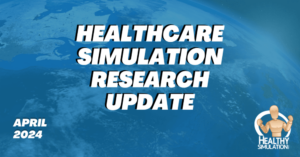
Healthcare Simulation Research Update April 2024

Learn About SENAT: The Healthcare Simulation Educator Needs Assessment Tool
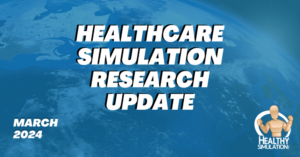
Healthcare Simulation Research Update March 2024

Healthcare Simulation Research Update February 2024

Comment Montrer son Travail en Simulation en Santé

Healthcare Simulation Research Update December 2023
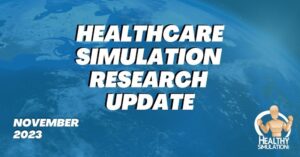
Healthcare Simulation Research Update November 2023

Clinical Simulation Research Focus: Debriefing Faculty Aspects
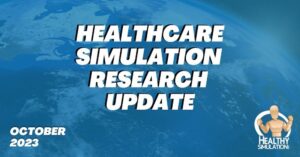
Healthcare Simulation Research Update October 2023

Clinical Simulation Research Focus: Debriefing Methodology 2023 Part II

Clinical Simulation Research Focus: Debriefing Literature Reviews 2023
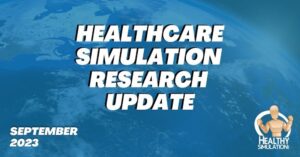
Healthcare Simulation Research Update September 2023
Sponsored Content:






